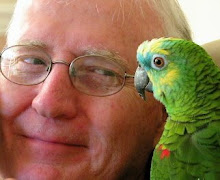Our little community church is not very liturgical, but we do have an informal observance of Advent that leads up to a special Christmas eve service. Because Advent was never a significant part of my previous church experience, I did some research. The traditions vary quite a bit in various churches and denominations. Some are more heavily laden with symbolism and iconic representations than others.
These excerpts convey our church's experience of the season as I understand it:
The light (itself) reminds us that Jesus is the light of the world that comes into the darkness of our lives to bring newness, life, and hope. It also reminds us that we are called to be a light to the world as we reflect the light of God's grace to others (Isa 42:6). The progression in the lighting of the candles symbolizes the various aspects of our waiting experience. As the candles are lighted over the four week period, it also symbolizes the darkness of fear and hopelessness receding and the shadows of sin falling away as more and more light is shed into the world. ...
Finally, the light that has come into the world is plainly visible as the Christ candle is lighted at Christmas, and worshippers rejoice over the fact that the promise of long ago has been realized.
The first candle is traditionally the candle of Expectation or Hope. This draws attention to the anticipation of the coming of a Messiah that weaves its way like a golden thread through Old Testament history. As God’s people were abused by power hungry kings, led astray by self-centered prophets, and lulled into apathy by half-hearted religious leaders, there arose a longing among some for God to raise up a new king who could show them how to be God’s people. They yearned for a return of God’s dynamic presence in their midst. And of course now it represents our hope in the ultimate Advent. ...
It is truly a humbling experience to read back through the Old Testament and see how frail and imperfect all the "heroes" actually are. Abraham, the coward who cannot believe the promise and his wife Sarah who tries to take matters into her own hands. Jacob, the cheat who struggles with everybody and Leah, who participates in deception to become his first wife. Joseph, the immature and arrogant teen. Moses, the impatient murderer who cannot wait for God. Rahab, the turncoat harlot. Gideon, the cowardly Baal-worshipper. Samson, the womanizing drunk. David, the power abusing adulterer. Solomon, the unwise wise man. Hezekiah, the reforming king who could not quite go far enough. And finally, a very young Jewish girl from a small village in a remote corner of a great empire.
It never ceases to amaze me why God could not have chosen "better" people to do His work in the world. Yet if God can use them, and reveal Himself through them in such marvelous ways, it means that He might be able to use me, inadequate, and unwise, and too often lacking in faith that I am. And it means that I need to be careful that I do not in my own self-righteousness put limits on what God can do with the most unlikely of people in the most unlikely of circumstances. I think that is part of the wonder of the Advent Season.
Friday, November 30, 2007
Subscribe to:
Post Comments (Atom)

No comments:
Post a Comment